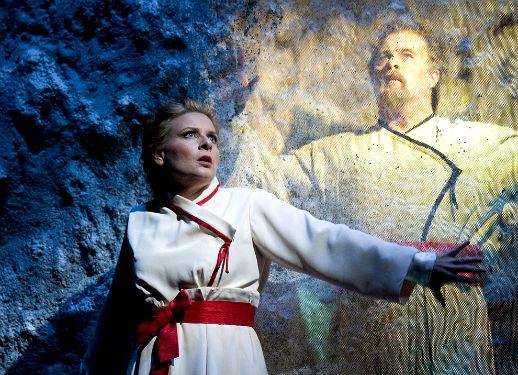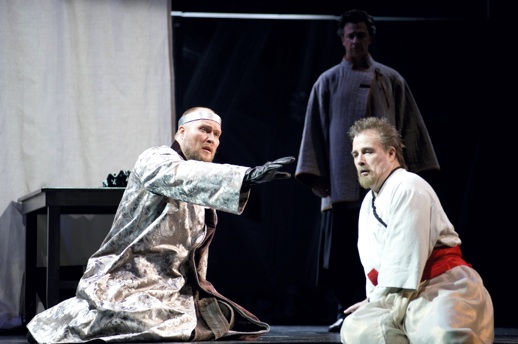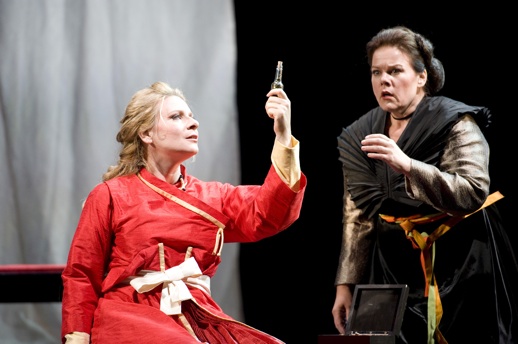
Almost the best part (aside from Stephen Milling‘s world-class König Marke): not a peep out of the Seattle audience until the very last note died away, all three acts. What a rare delight! I don’t know whether to credit the polish of Asher Fisch‘s elegant conducting or Duane Schuler‘s clever lighting design—or simply the good manners of the Seattle audience.
Peter Kazaras‘s production (seen August 12) was a bit of a puzzlement. There is no particular reason to insist on naturalism in this opera since, unlike nearly ever opera composed before it, it is not a stage action but, to a far greater extent, a meditation on the internal emotional states of its two principal characters. They spend much of the opera condemning the “Day,” the world where they must inhabit social roles and are subject to “honor,” “duty,” and their relationships to other people—the real world unreal to them from the moment (if not before it) they drink the “love drink” at the climax of Act I.
From that instant, they long for, live only in, the “Night”; no one else and nothing else really exists for them. Even sexual union does not seem to be on their minds—they yearn for a mingling of souls, a complete mingling of essence, for which sex (the suggestion is implicit if unspoken) would be a mediocre substitute. (In a pre-opera lecture, a member of the opera company staff pointed out the contrast of this symbolism to that of Mozart’s optimistic Magic Flute, which Seattle will present next spring.)
Only in the total abnegation of will that is death does Tristan attain anything like true understanding, whereupon Isolde reaches what Wagner paradoxically called “Enlightenment”—Verklärung—and that Wagnerians ever since have preferred to call the Liebestod, “love-death,” though Wagner nowhere insists that she die at the opera’s end. Some Isoldes collapse on Tristan’s body, some stand straight up. In Seattle, she fell across his breast and apparently kissed him. That was striking as the lovers had not, in fact, touched each other previously all night—a fascinating idea, that stressed the way their earthly existence—their very embodiment—prevented true encounter.
In avoiding literalism, the Seattle staging often set up other puzzles for an audience to strain to comprehend when they could have been focusing on the music. Acting movement was static and formal, not naturalistic—which suited the director’s conception and avoided several of the work’s pitfalls. The use of projections (waves in Acts I and III; woods in Act II) to show us inner (or is it outer?) states is cleverly and atmospherically brought off, and having a spotlight focused on the iconic Cup in Act I is clearly a proper step—it makes the drink more significant in case anyone had missed that point.
Robert Israel‘s costumes avoid clear links to any era or place, modern or ancient or of Wagner’s era—but then why have plush Biedermeier furniture on the deck of the ship and, later, in Cornwall’s garden? A Recamier chaise adds nothing to the story—it isn’t even used by the characters—so why is it here? To make us think of Freud’s couch? I like idea that Tristan and Isolde do not, cannot, touch each other until the final tableau, and stage embraces by people who are trying to sing at the same time can be embarrassing. But couldn’t they at least look at each other? At least after drinking the potion?
Clifton Forbis has put on weight, but this brings gravel rather than gravitas to a voice not remarkable for lyricism to begin with. He had cancelled an earlier performance due to ill health, and may not have been as well as he thought he was. Only at the end of Act II were we in the presence of a heldentenor; his agonies thereafter, in Act III, were very pleasingly sung.
Annalena Persson, the Isolde, a Swedish debutante, is lovely when she’s angry—her voice, that is, which becomes brilliant and clear under pressure, especially at the top of her range. Isolde, of course, is angry a great deal of the time, at least in Act I, and these moments were often thrilling—but whenever soft singing, brooding, yearning were called for, as they often are in this complicated role, she produced an irritating sound, tuneless, unattractive, beating about the notes rather than hitting them. What role is shrill throughout its length? Nothing in Wagner—perhaps Elektra would suit her. But she too may have been warming up—some of her soft singing in Act II, especially at its conclusion, was not ungracious. By the end of the opera, however, she had lost her footing again—it was a cautious, effective, but far from satisfying Liebestod. Persson is either an immature artist singing beyond her ability or has been poorly trained on the basis of her genuine gifts.
Margaret Jane Wray sang Brangaene, and she never opened her mouth without making me wish she’d been Isolde. The voice is lovely and easily produced—and (we know from her Sieglinde) can be sensuous when that is called for, as it is not in this role. Her acting was reserved—as the staging demanded. Happily, Mr. Kazaras did not demand—as Francesca Zambello did in Seattle’s last Tristan—that Brangaene run across the entire stage in Act I before launching her cry of distress after the potion-taking. A rational touch, Mr. Kazaras!
I’ve almost always been lucky in my King Markes, who have included Kurt Moll, Matti Salminen, René Pape and John Tomlinson, so that I’ve come over the years to regard Marke’s reproaches as something of a “standard,” a juicy plum in the opera, rather than the bore earlier generations thought it. Stephen Milling opens his mouth and steps immediately into that category, a cavernous, world-class sound. Milling did not disappoint in sheer sound, but rather scanted the emotional depths of Marke’s pain. This, I think, will come to him with more experience. In the meantime, we can wallow in sensuous note-spinning.
Greer Grimsley sang an effective Kurwenal, although his swagger sometimes seemed to come from some other, more naturalistic production than the painfully symbolic one at hand. In small roles, Jason Collins‘s Melot and Simeon Esper‘s Sailor/Shepherd both made me wish to hear them again, in longer parts.
Fisch falls on the swiftly paced side of Wagnerian conductors, but he infallibly lets the motifs—and the singers—breathe the rarefied atmosphere. His was a pleasing but not an overwhelming Tristan; it lacked the sensuous, hallucinogenic quality this music can possess in the hands of a major orchestra, an experienced and devoted Wagnerian conductor. Fisch produced a lighter, a less lush sound—due to the acoustic of McCaw Hall or to a slightly smaller orchestra?—than I am used to in this opera, but on its own terms was a persuasive, often exciting reading, full of pointed dramatic moments whether the staging picked them out or not. Too, the fact that the singers were directed not to look at each other meant that they could pay more attention to Fisch, which he seemed to reciprocate with intimate and encouraging gestures.
The Seattle Opera, as everyone knows, prints the best Wagnerian T-shirts. Their gray “Fafner and Fasolt Construction Company (rates negotiable)” is a classic, but they now have a blue “Valkyrie Air—the last flight you’ll ever take!” I, however, went for the burgundy “Life is short, Opera is long, Wagner is forever.” In Seattle, he can seem as eternal as Mount Rainier.
All photographs © Rozarii Lynch




